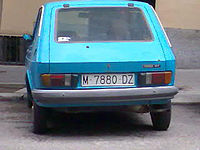SEAT 127
| SEAT 127 | |
|---|---|
 | |
| Overview | |
| Manufacturer | SEAT |
| Production | 1972–1982 |
| Assembly | Spain |
| Body and chassis | |
| Class | Supermini, subcompact (B) |
| Body style | 3 and 5-door hatchback 2 and 4-door fastback sedan |
| Related | Fiat 127 SEAT 1200 Sport |
| Powertrain | |
| Engine | 903 cc OHV I4 1010 cc OHV I4 |
| Transmission | 4-speed manual[1] |
| Chronology | |
| Successor | SEAT Fura |
The SEAT 127 is a supermini produced by the Spanish automaker SEAT between the spring of 1972 and 1982, based on the Fiat 127.
Due to SEAT design policy, a four-door variant of the car (without a hatchback lid, in spite of the fastback roofline) was added to the lineup in 1973.[2] While usually fitted with the same 903 cc engine as in the Fiat 127, SEAT also produced a unique variant of the 127 OHV engine. This had 1010 cc instead of 903 cc and produced 52 PS (38 kW) rather than the 43 or 45 PS (32 or 33 kW) of the smaller unit.[3]
- SEAT 127LS 5-doors.
- SEAT 127LS 5-doors (rear).
The SEAT 127 underwent the same styling modifications as did the Fiat 127 (new grille, taillights, bumpers) for the Serie 2, of January 1980. At the same time, a full five-door hatchback bodywork also became available.[1]
- SEAT 127 serie II 2-doors.
- SEAT 127 serie II 5-doors.
- SEAT 127 serie II (rear).
- Emelba 127 Pick Up (left).
When their licence from Fiat expired, SEAT redesigned some parts of the car and renamed it the SEAT Fura. Some design parts of this model were also used in the Ibiza Mk1. SEAT produced 1,238,166 units of the 127 between 1972 and 1982.
References
- ^ a b Braunschweig, Robert; Büschi, Hans-Ulrich, eds. (March 6, 1980). "Automobil Revue '80" (in German and French). 75. Berne, Switzerland: Hallwag, AG: 469.
{{cite journal}}: Cite journal requires|journal=(help) - ^ Freund, Klaus, ed. (1978). Auto Katalog 1979 (in German). Vol. 22. Stuttgart: Vereinigte Motor-Verlage GmbH & Co. KG. p. 116.
- ^ Auto Katalog 1979, p. 208






